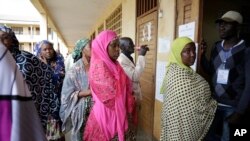In Cameroon, thousands of women protested on International Women’s Day Tuesday demanding more political power and government jobs. Women make up more than half of Cameroon’s population, but there is not a single female among the country’s 10 regional governors or council presidents.
Thousands of women turned out at the 20 Boulevard in Cameroon’s capital singing that they do not want to be treated as inferior to men any longer.
The Cameroon government said it expected between ten thousand and fifteen thousand women for International Women’s Day celebrations on Tuesday. But Cameroon’s Ministry of Women's Empowerment said more than 20,000 came out in Yaounde to protest.
Similar protests took place in towns and villages across Cameroon, in both French- and English-speaking areas.
Nicoline Nwenushi Wazeh, founder of the NGO Pathways for Women’s Empowerment and Development, PaWED, says Cameroon’s government is not doing much for women to gain more political power or reach representation goals set by the United Nations and African Union.
“All four ministers of state are men. Out of the 39 ministers we only have six women. All ten governors of the regions are men. Of the 58 divisional officers we have only two women. The lack of political will has made it that Cameroon government neither respects the universal quota of 30% nor the African Union quota of 50-50,” she said.
Nwenushi said there are only 61 women in the 180-member the lower house of parliament and the Senate has 26 women against 74 men.
Mumah Bih Yvonne of the Cameroon Women’s Peace Movement’s says both President Paul Biya and Cameroon’s electoral laws make it difficult for women to climb to leadership positions.
“The electoral code does not clearly spell out what quota is reserved for women. It just mentions that gender should be taken into consideration. Women need to be pushed by political will so I think this government can do better by appointing women who are very apt in different positions,” Bih said.
Marie-Therese Abena Ondou is Cameroon’s Minister of Women’s Empowerment and the Family. She says the ministry she leads has been educating men to consider women as equals. She says she also educates women to contest for elected positions and not to be scared of intimidating men.
“Many men feel threatened when we talk about equality and we want to reassure them (men) that it is not that they [men] will be pushed aside, it is working together. Men and women are born equal and we should try to remember that both have the same potential if given the same opportunities,” Ondou said.
The U.N. marks International Women's Day on March 8 to bring attention to women’s contributions to development and stop inequities.
This year’s theme was “Gender Equality today for a sustainable tomorrow.




